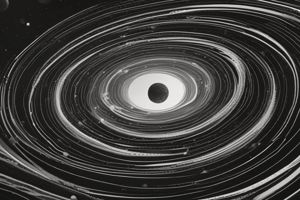Podcast
Questions and Answers
What did Albert Einstein's general theory of relativity describe gravity as?
What did Albert Einstein's general theory of relativity describe gravity as?
- A cosmic phenomenon
- A property of matter
- A warping of space and time caused by mass and energy (correct)
- A force
What is the phenomenon known as when matter falls into a black hole?
What is the phenomenon known as when matter falls into a black hole?
- Cosmic radiation
- Hawking radiation (correct)
- Gravitational lensing
- Gravitational collapse
How large would a black hole be if the Earth was compressed down to the size of a sugar cube?
How large would a black hole be if the Earth was compressed down to the size of a sugar cube?
- One kilometer across
- One meter across
- One centimeter across
- One ten-thousandth of a centimeter across (correct)
What happens to matter that comes within the event horizon of a black hole?
What happens to matter that comes within the event horizon of a black hole?
What is the visible effect created by the distortion of spacetime around a black hole, as described by Einstein's theories?
What is the visible effect created by the distortion of spacetime around a black hole, as described by Einstein's theories?
What is the primary difference between a black hole that is ten times more massive than the Sun, and a black hole the size of a sugar cube with the mass of the Earth?
What is the primary difference between a black hole that is ten times more massive than the Sun, and a black hole the size of a sugar cube with the mass of the Earth?
What property of black holes is described as stretching objects into a long, thin shape resembling spaghetti?
What property of black holes is described as stretching objects into a long, thin shape resembling spaghetti?
Why do researchers study black holes according to the text?
Why do researchers study black holes according to the text?
What implications do black holes have for the universe according to the text?
What implications do black holes have for the universe according to the text?
What aspect of reality are researchers hoping to understand by studying black holes?
What aspect of reality are researchers hoping to understand by studying black holes?
How are black holes described in the text in terms of their impact on space-time?
How are black holes described in the text in terms of their impact on space-time?
What is one reason why black holes continue to fascinate scientists and non-scientists according to the text?
What is one reason why black holes continue to fascinate scientists and non-scientists according to the text?
Flashcards are hidden until you start studying
Study Notes
Black Holes - A Fascinating Phenomenon of Space
Black holes are incredibly dense cosmic objects that exert an extremely strong gravitational pull. They were first proposed by Albert Einstein's general theory of relativity, which described gravity not as a force but as a warping of space and time caused by mass and energy. Despite their name, black holes do not actually appear black; they emit radiation, including light, when matter falls into them, a phenomenon known as Hawking radiation.
The size of a black hole is determined by its mass. For example, if you compress Earth down to the size of a sugar cube, it would create a black hole only one ten-thousandth of a centimeter across with a mass nearly equal to our planet's. Conversely, a star ten times more massive than our sun will collapse down to a one-inch black hole when it runs out of fuel and dies. Matter can get close enough to come within the event horizon - effectively the edge that marks the point where escape velocity is exceeded - of a black hole, but nothing can cross this boundary without experiencing the intense gravitational forces.
One of the most fascinating aspects of black holes is how they affect space around them. According to Einstein's theories, black holes distort spacetime so much that space itself appears to curve around these giants, creating a visible effect known as a black hole shadow. This phenomenon has been observed directly through imaging from telescopes like the Event Horizon Telescope.
Black holes also exhibit another intriguing property called "spaghettification". As matter gets closer to the black hole, the immense gravitational difference between the two sides stretches anything unfortunate enough to get too near into a long, thin shape resembling spaghetti.
Despite these extreme characteristics, black holes have significant implications for the universe beyond their immediate surroundings. Their existence supports the idea that something entirely new may arise from the violent death of stars and other astronomical events. Additionally, researchers are studying black holes to better understand quantum mechanics, gravity, and possibly even the nature of reality itself.
In conclusion, black holes represent one of the most enigmatic phenomena in our understanding of the universe. From their profound impact on local space-time to their potential role in shaping cosmological concepts, these celestial bodies continue to fascinate scientists and non-scientists alike with their unique properties and the mysteries they hold.
Studying That Suits You
Use AI to generate personalized quizzes and flashcards to suit your learning preferences.




